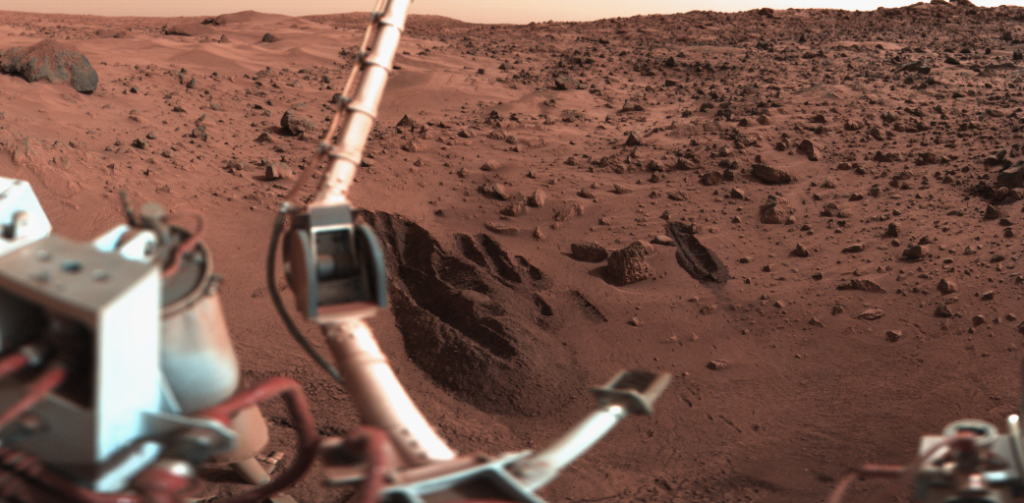
I learned this today. Mars is red because it is basically rusty.
The surface of Mars is covered in a deep layer of fine iron oxide dust. Iron oxide is caused when iron oxidizes. Iron oxide is the chemical name for rust.
Iron molecules combine very easily with oxygen molecules. For iron to rust, you need three things: iron, oxygen, and water. When the water comes into contact with iron, it combines with the carbon dioxide in the air to make a weak carbonic acid. This is a good electrolyte, and it starts to dissolve the iron. The dissolved iron loses an electron which combines with the oxygen in the atmosphere. The iron molecule gives up electrons to the oxygen molecule and the oxygen and the dissolved iron bond to form iron oxide. Iron oxide is rust and is reddish-brown. The iron oxide molecule is larger than a simple iron molecule, so it makes the metal expand because it needs more space. This causes cracks that allow water to get farther into the iron, continuing the rusting process. These expanded pieces of metal become brittle rust flakes. If given enough time, iron can completely oxidize to rust. The iron oxide flakes will crumble until they are dust.
So, the question is, why is the surface of Mars red? Mars, like Earth, contains a lot of iron. Earth has a very strong gravity compared to Mars and most of this iron has sunk towards the core. The gravity on Mars is less strong, so a fair amount of iron has remained on the surface. This iron has, over billions of years, oxidized and become rust. The question is, if we need iron, water, and oxygen to make rust, where do the water and the oxygen come from on Mars?
The oxygen is the easy part. The atmosphere of Mars has carbon dioxide, which is made up of one carbon molecule and two oxygen molecules. The iron can combine with the oxygen in the CO2 to make rust. The water is the less easy part. Some people have taken the presence of iron oxide on the surface of Mars as proof that there must have been water there eons ago. If there was no water, then you couldn’t have iron oxide, is the argument, so there must have been water. There is frozen water on Mars and there are what look like riverbeds and water channels, but that doesn’t necessarily mean Mars used to have running water. If there had been water, Mars would have carbonates, which form when water and CO2 interact. There would also be clay from weathered rock and there are olivine mineral deposits on the surface that would not be there if Mars had had running water.
Another theory is that the iron oxide dust on the surface of Mars came from iron-rich meteorites. Every year, about 60 tons of meteoritic debris falls onto Mars and this has been happening for a few billion years. That quickly adds up. The iron molecules in the meteorites release an electron when they are hit by ultraviolet light and that electron can bind with the oxygen in the atmosphere, causing iron oxide.
So, the surface of Mars is red because it is covered in a deep layer of iron oxide, which is rust. Iron becomes rust when water dissolves it, making it give up electrons which bind with oxygen molecules, creating iron oxide. Iron oxide is better known as rust and is red. Mars has oxygen contained in the CO2 of its thin atmosphere. The question of where the water came from is unknown. Either the iron came from meteorites and ultraviolet light did the trick, or the presence of iron oxide is evidence that there used to be water on Mars. I guess we might know the answer to this one day, but not yet. And this is what I learned today.
Sources
https://www.jpl.nasa.gov/edu/learn/video/mars-in-a-minute-is-mars-really-red/
https://en.wikipedia.org/wiki/Mars
https://www.cslsilicones.com/en/about/blog/item/what-causes-corrosion.html
https://en.wikipedia.org/wiki/Rust
https://www.wonderopolis.org/wonder/why-do-some-things-rust
https://science.howstuffworks.com/question445.htm
https://slate.com/news-and-politics/2004/01/why-is-mars-red.html
https://www.quora.com/What-causes-rust-to-form
https://skyandtelescope.org/astronomy-news/rusting-mars-without-water/
